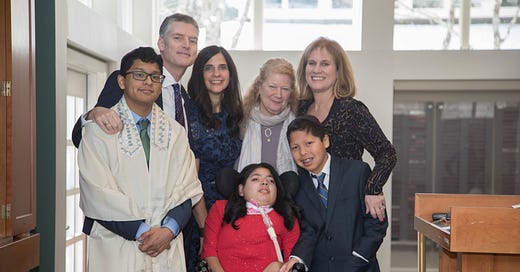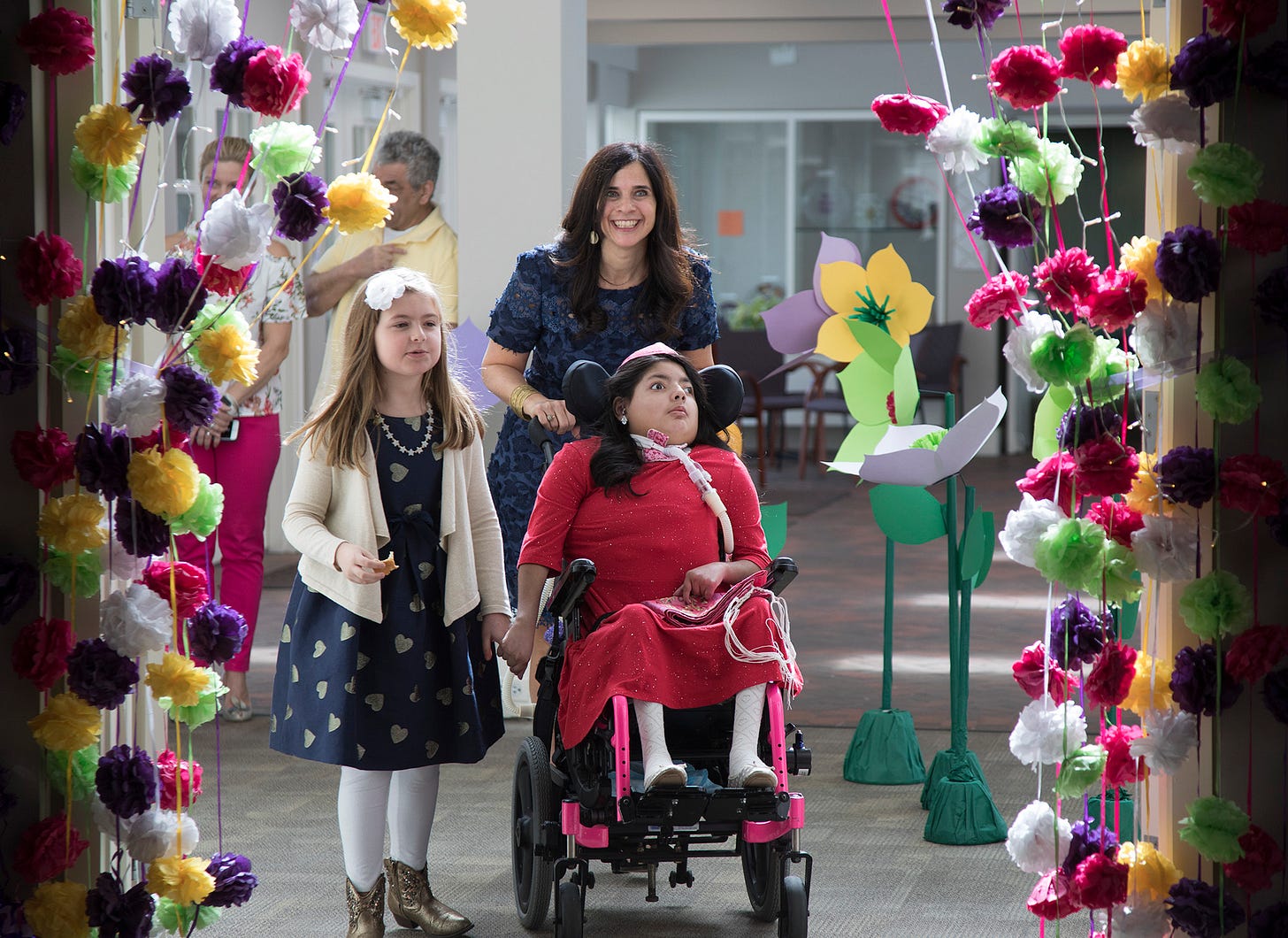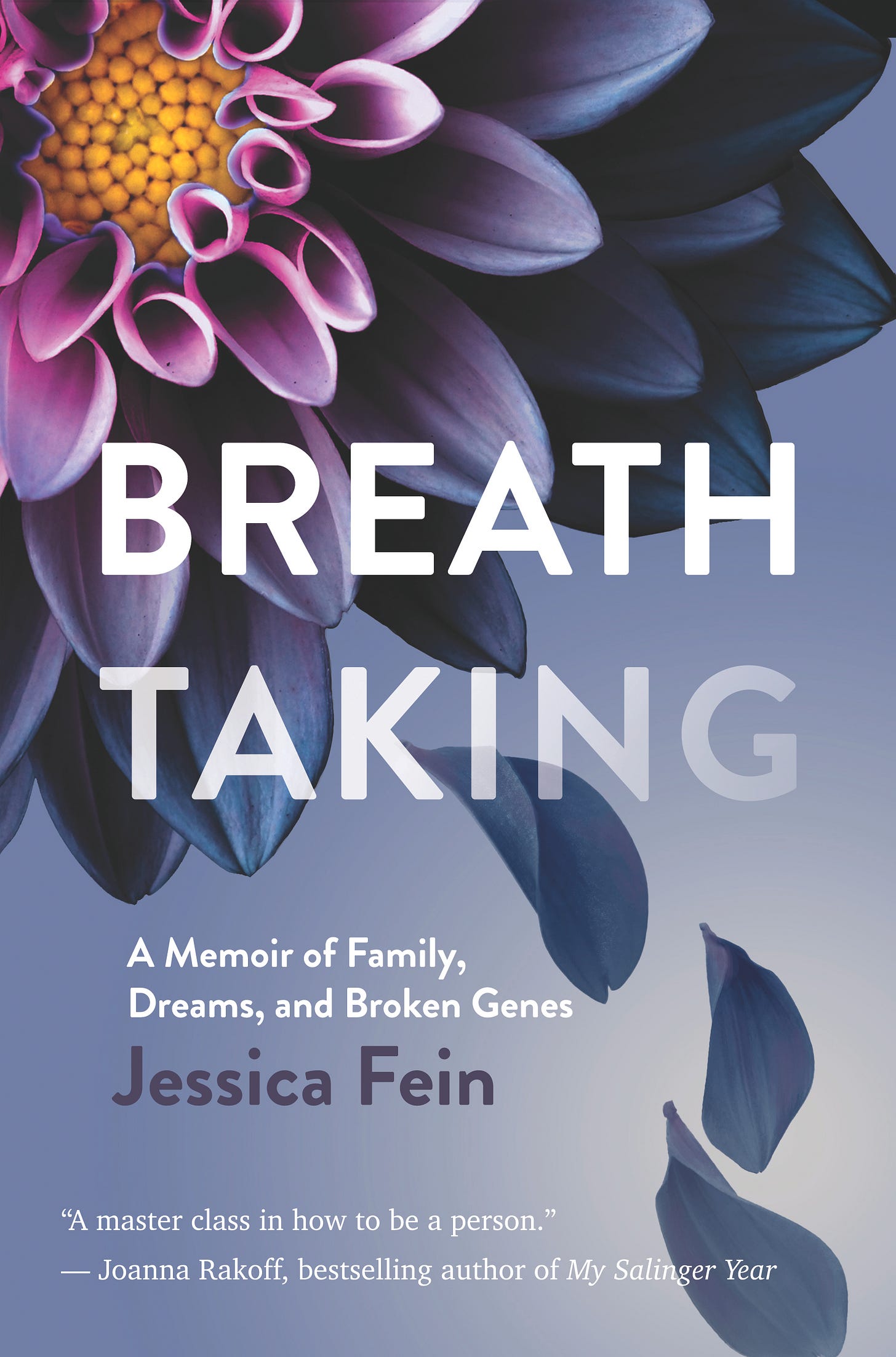In our synagogue, dates for bar and bat mitzvah ceremonies are assigned years in advance, way before your child has stopped squirming in the pews or surreptitiously putting their iPad inside the prayer book during services. You know the exact date your child will become an adult—at least in the eyes of the Jewish world—while they’re just getting braces and mastering math facts.
We’d known Dalia’s bat mitzvah date for years, but now that the date was approaching, we were more than a little ambivalent.
There were practical concerns, of course. Dalia could no longer speak or read, both crucial skills to saying a blessing over and chanting from the Torah. We also had to consider her extreme fatigue. A two-hour service followed by an even longer party would definitely result in a major energy crash.
But then we remembered how worried we were years before when planning Jonah’s bar mitzvah. We’d figured Dalia would be exhausted and had hired a nurse and an aide to take her home early. As it crept toward the agreed-upon time of her exit, Rob and I watched Dalia in the center of the dance floor. There she was, beaming from her chair, holding the hands of family members and friends who’d crowded around her, each waiting for a turn to spin and twirl with our seated beauty, who was radiating so much joy. We gave the nurse and the aide the rest of the night off and went to join Dalia on the dance floor. I might have felt a little bad for Jonah, since Dalia was clearly the center of attention and it was, after all, his event, but he was too busy trying to sneak a kiss from Eliana in the photo booth to notice.
How could we take another chance for so much happiness away from our daughter? And, for that matter, we didn’t want to deprive her of the opportunity she so deserved, the chance to take her rightful place in our community.
Dalia would never learn Hebrew, never go to overnight camp or sing Jewish songs or learn even a single Israeli dance. Yet every time we went to services, Dalia insisted we sit in the front row so she could hear the music clearly, clap her hands, and let loose with her shoulder dance. Her quiet participation in the music emanating from the bimah (the podium at the front of the room) could rival the loudest gospel choir.
There was also what it meant to me. I could still sing my own bat mitzvah portion by heart. I remembered that when my friend Dana’s mother saw me shaking before my own service, she did some deep-breathing exercises with me to calm me down. I still had the bracelet my mother gave me and the tiny prayer book gifted to me by the synagogue. Dalia’s childhood looked nothing like mine. I wanted one day of overlap. And I wanted the cocktail of nostalgia and pride I’d consumed at Jonah’s bar mitzvah.
On top of all that, there was the matter of our boys. Depriving Dalia of a bat mitzvah would have sent them a loud message that Dalia wasn’t equipped for or deserving of the same rites of passage they were entitled to. It would be yet another reminder of her difference, rather than a reassurance of her more important sameness.
We scheduled a meeting with a member of the synagogue clergy, Cantor Hollis, to help us think through if—and how—to give Dalia a bat mitzvah. Cantor Hollis is one of those people who always makes you feel a little bit better about yourself and about the world for having someone like her in it. When she sings, you understand that if you believed in angels and if you thought those angels were in the business of singing, this is what their voices would sound like.
“What should we do?” I asked her. “How can Dalia have a bat mitzvah when she can’t read or speak and might not even be able to understand what’s going on?” We didn’t want to make her a spectacle in any way.
“I hear you,” Cantor Hollis began. “Let’s think about what Dalia can do as our starting point, rather than focusing on what she can’t.”
Dalia couldn’t chant Torah, but she could push a button on an iPad. Cantor Hollis told us about a program called Gateways that provides Jewish education to kids with all kinds of abilities. We signed up, and every Sunday Dalia and I spent the morning in a small classroom with other young teens, some in wheelchairs and diapers, some who were silent like Dalia, some who could speak, and others who verbalized in their own unique way. The kids had varying cognitive and physical abilities, but they had one thing in common: every one of them was preparing for an upcoming bar or bat mitzvah ceremony.
The teacher, a woman named Rebecca, sat with Dalia week after week and sang the prayers to her. And on the day of Dalia’s bat mitzvah, when Dalia pushed the button on her iPad in time for each prayer and reading of a Torah passage, it would be Rebecca’s voice that rang out through the sanctuary.
And that wasn’t all. Dalia couldn’t write a commentary on the weekly Torah reading, but she could sit with Rob as he wrote one, and she could hold his hand while he read it to the congregation.
Dalia couldn’t carry the Torah around the perimeter of the synagogue, but Jonah could, and Theo could push Dalia in her wheelchair beside Jonah as he did so.
And there was the most important thing Dalia could do: she was more than capable of celebrating, of joyously being seen as a full member of her community.
Once we decided to throw ourselves into preparing for the bat mitzvah, there was no way I was going to miss the opportunity to make it the most gloriously magical thing Dalia had ever experienced. The decorative motif was obvious—we’d transform the blank canvas of a party room into a bursting field of dahlia flowers. I worked with my friend Susan to envision an obscene abundance of pink and purple dahlias made of construction paper and measured to the exact height of Dalia’s sightline from her wheelchair. A little bit Oz-like, maybe a bit Dr. Seuss-esque, but utterly Dalia too.
The most important thing, Cantor Hollis told us, is that we find a way to meet Dalia where she was, so she could have a bat mitzvah that was meaningful to her and honored who she is. And so that’s what we prepared to do. We learned yet again that honoring what Dalia could do was worlds more important than grieving what she couldn’t. One day, more than likely, there’d be time for that grieving. But that time wasn’t now, and we weren’t going to waste a minute of her life grieving prematurely.
Excerpt from Breath Taking: A memoir of Family, Dreams, and Broken Genes, by Jessica Fein.
Order the book here:
Jessica Fein is an author, advocate, speaker, and podcast host. Her podcast, "I Don't Know How You Do It," features people whose lives look unimaginable and who triumph over seemingly impossible challenges. Jessica is a working mother and a relentless warrior in the memory of her dynamic daughter, whom she lost to a rare disease in 2022. Her work encompasses hope and humor, grit and grace - the tools that make up her personal survival kit. She's a seasoned media contributor, with forums including HuffPost, The Mighty, Psychology Today, Zibby Mag, and Kveller. Jessica is a former Boston Globe opinion columnist and the author of a book on making the transition from college to the real world. She balances writing, podcasting, motherhood, and advocacy with her work as a senior marketing executive at a global multi-billion dollar education company. Jessica serves on the Board of Directors of MitoAction. She's the mother of three, whom she and her husband adopted from Guatemala. They live in Framingham, Massachusetts with their quasi-service dog, who trained himself.





